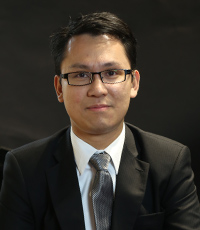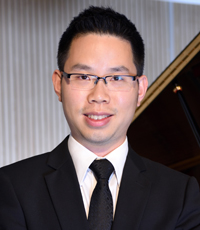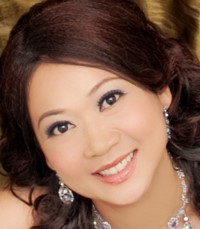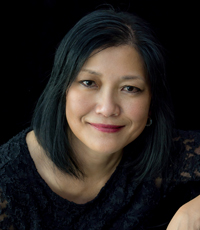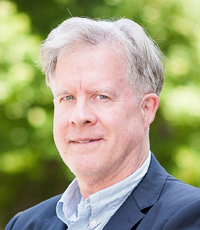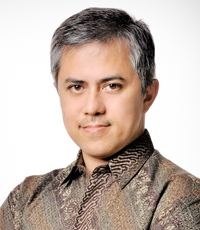Events 2018 2018
Recital Series
A Piano Recital Presented by Cheong Yew Choong
Date: 7 June 2018, 8pm
Venue: Recital Hall, Block G, South Wing campus
The theme of the recital is "fantasy" which suggests the imagination and improvisatory skill of the composer. The essence of fantasy lies in the characters of distortion, exaggeration and elusiveness. Each of the three works selected for this recital—Mozart’s Fantasie in D minor K.397, John Corigliano’s Fantasia on an Ostinato and Schumann’s Fantasiestücke Op. 12—conveys the unique blend of expanded tonal spectrum, pianistic techniques and the composer’s impulse.
A Piano Lecture Recital Presented by Lucas Wong
Date: 7 June 2018, 9pm
Venue: Recital Hall, Block G, South Wing campus
"Mostly Debussy V: Debussy at 100" The final concert of the "Mostly Debussy" series wraps up with a newly commissioned piano cycle, Tombeau de Debussy, performed by Fazioli artist Dr. Lucas Wong. This work is partly inspired by traditional gamelan music and the Debussy’s Cello Sonata, in addition to its celebratory gesture to the 100th anniversary of Debussy’s death. The rest of the evening features two Debussy pieces, and eight Couperin preludes which have virtually never been programmed by any pianist in a recital.
A Piano Recital Presented by Lim Pei Sien
Date: 8 June 2018, 8pm
Venue: Recital Hall, Block G, South Wing campus
This recital will feature the music of 3 distinguished American composers. First piece on the program is Samuel Barber’sSonata for Piano, Op. 26, a repertoire which has become a concert staple since its premiere in 1950. Robert Muczynski’s Desperate Measures(Paganini Variations), Op. 48 is next, and the recital will end with the intense and colourful Gargoyles, Op. 29 by Lowell Liebermann. The piano is exploited fully in these pieces, from lyricism to highly motoric and percussive. Despite the extended use of harmony, tonality and chromatic notes, these 20th century piano pieces maintain a strong sense of tonal center.
A Piano Recital Presented by Sylvia Wang
Date: 8 June 2018, 9pm
Venue: Recital Hall, Block G, South Wing campus
The recital will begin with Olivier Messiaen: Prelude (A Reflection in the Wind), followed by Toru Takemitsu’s Rain Tree Sketch II, in Memoriam Oliver Messiaen. She continues with the last movement of the epic Sonata by Akira Miyoshi, also French-influenced. Representing China will be Chen Yi’s colorful Duo Ye. Dr. Wang will conclude with 4 Preludes from Debussy’s second book, La Puerta del Vino, Bruyeres, Ondine and the brilliant Feux d’artificeor Fireworks.
Seminar Series
A Seminar Presented by Dr. Thomas Linde on "The Illusive Art of Practicing the Piano"
Date: 8 June 2018, 2:45pm
Venue: Recital Hall, Block G, South Wing campus
For pianists, practicing the piano is one of the most important skills that one can develop. In many cases, however, piano teachers do not spend enough time discussing good practice habits with their students. When walking down the practice room halls of conservatories, one is bound to hear students practicing too fast or mindlessly repeating passages in ways that could only reenforce bad habits. Although how one practices should be, to an extent, personally designed to fit one's specific strengths and weaknesses, some methods are important for everyone who plays the piano. It is the purpose of this lecture to illuminate some of the most important concepts of practicing. The study will discuss the mental and biological phenomena that occur in the brain when developing skills and show what one can do to learn more quickly and efficiently. Piano practice is a both a skill and an art that pianists of all ages and levels must continuously hone. It is my hope that this lecture will provide students at the UCSI International Piano Festival and Competition with some ideas that will help them improve their practice skills so that they can more effectively use their time in the practice room.
A Seminar Presented by Mr. Iswargia Renardi Sudarno on "Performing Late 18th Century Keyboard Music in a Modern Piano"
Date: 8 June 2018, 4:15pm
Venue: Recital Hall, Block G, South Wing campus
We all know that 18th Century Piano, or so called fortepiano, is different then the current piano that we all familiar with. This presentation will discuss about the performance practice of keyboard playing at that time, and certain aspect that might need to be explored when playing it in the modern piano.
Join Us At
6th International Piano Festival And Competition 2024 2024
Join us and Immerse yourself in a cultural and musical celebration, where aspiring talents meet renowned pianists, and where music appreciation thrives through exceptional performances, enlightening master classes, and insightful lectures.
